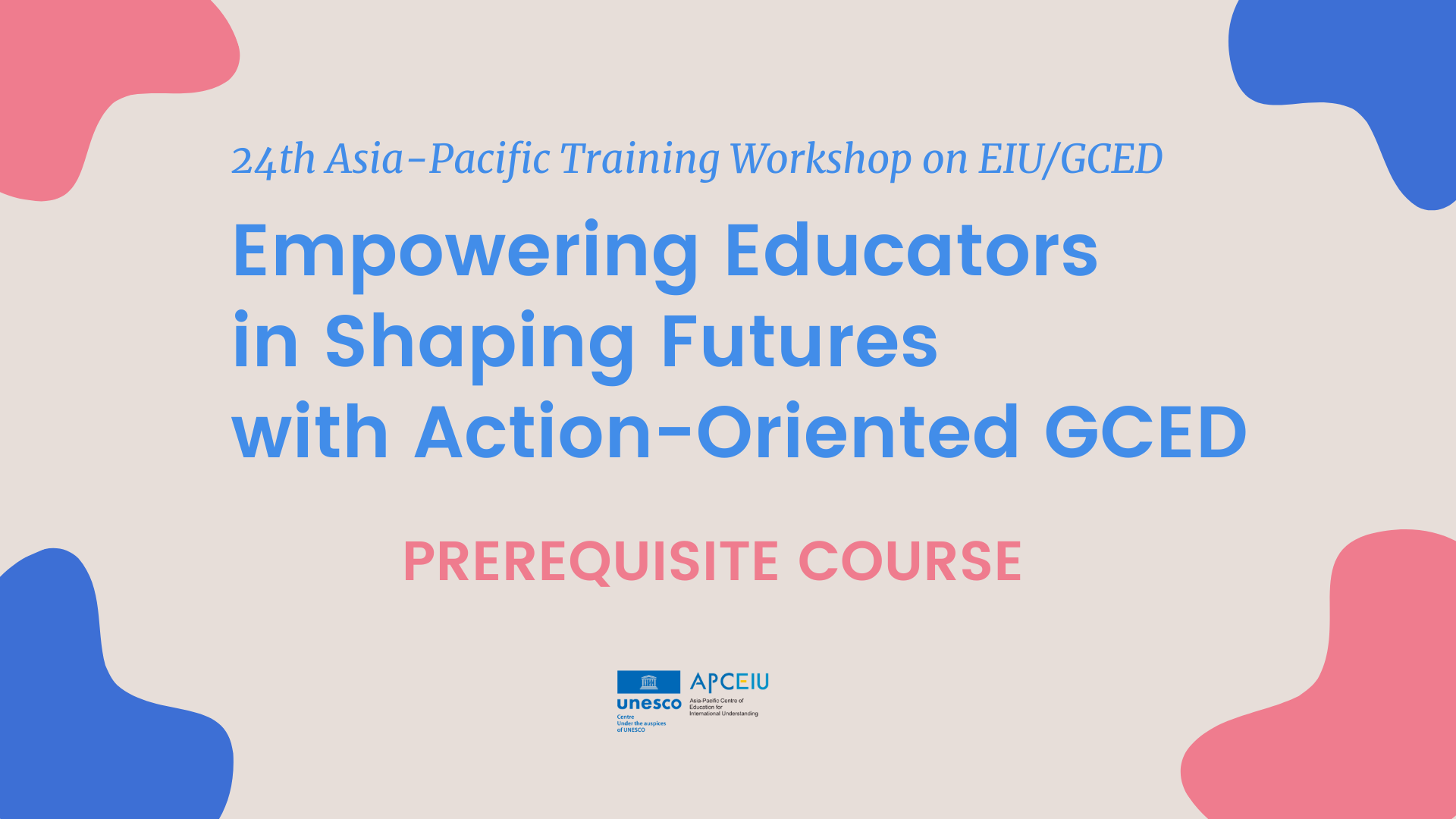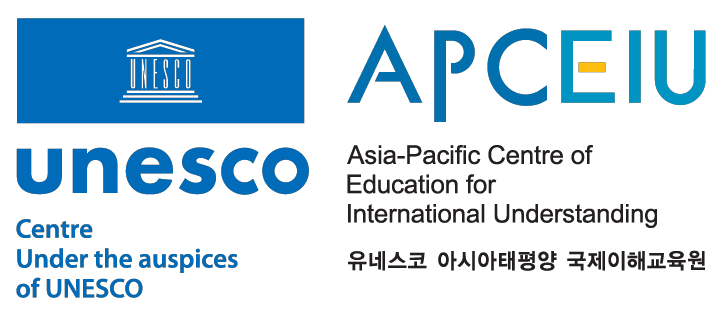
개방형 강좌자습형 강좌
Prerequisite course for 24th Asia-Pacific Training Workshop on EIU/GCED
| 모집기간 | 2025-03-19 ~ 2025-06-15 |
|---|---|
| 학습기간 | 2025-03-19 ~ 2025-06-15(13 주) |
| 강좌아이디 | 2025_80_CL005_2_1_ |
각자의 학습 속도에 맞춰 강좌를 수강하세요
이수증 발급
강좌 이수 직후 이수증을 발급 받으세요무료강좌
강좌 리뷰
-
Syarifuddin SyarifuddinI am very pleased to watch and listen to these lectures, they helped me broaden my ideas about the significance of education. I am so happy to feel that I should be a more responsible global citizen. As an educator, I need to obtain more ideas about SDGs and GCED and change my pedagogy as well.
-
Shonhiwa TawandaI am happy to attend these lectures; they are informative and helpful. It is very important for a teacher to have knowledge of global citizenship and how to apply it in the education process.
-
Alikhan Mohammad TaibIt is an indulging experience since its like the second time I have attended online course. The video lectures were very useful especially on its delivery pace and clarity of presentation. As a curriculum developer, it provides me a general ideas of GCED importance to a certain community and the world. I am looking forward for further studies on GCED especially on its implementation process particularly on how to integrate the GCED framework to our own local curriculum framework. Selections of topics as well as pedagogical approaches can be crucial in order for teachers to deliver the content effectively and efficiently.
-
Zulfiya Khabirova Zulfiya KhabirovaAs a teacher, I am aware of the significance of the Sustainable Development Goals (SDGs), in particular Goal 4: Quality Education and Global Citizenship Education (GCED), in terms of fostering learning that is both inclusive and equitable. For the purpose of incorporating critical thinking and global awareness into my work, I have utilised project-based learning, discussion of current events, experiential learning, and the incorporation of technology. Although students have been able to tackle practical concerns with the support of these tools, I appreciate the objective of altering attitudes via reflective thinking, community-based learning, and student agency since all of these approaches address obstacles that are encountered in the real world. I would want to see more chances for students to engage in self-reflection, more possibilities for service-learning, and greater student choice about the design of their educational experiences. I hope that by developing these principles, I will be able to reshape students into individuals who are proactive, internationally conscious, and who have a beneficial impact on society.
-
Sharofiddinov ShohabbosI am very pleased to watch and listen to these lectures, they helped me broaden my ideas about the significance of education. I am so happy to feel that I should be a more responsible global citizen. As an educator, I need to obtain more ideas about SDGs and GCED and change my pedagogy as well.
-
Shekhar Nath Shekhar NathAs a teacher educator for several years, I have had the opportunity to observe, reflect, and analyse the evolution and progress made in the field of education in my own country and across the globe. The contributions made in the field of Science and Technology is immense and far reaching. However, the progress made in education holds several challenges, some of which are attainable and rest requiring wholistic approach to reduce and solve pressing issues. Over the years, with challenges facing the world, the need for shift in education is felt world wide and is not new in my own country. Although the need for shift is realised, it is far from reach due to gap in policies, political will, resource crunch, and community's will to accept the changes. I have been privileged to get opportunity to participate in the development of curriculum and text books beside teaching science subject in my country. Having to participate in such forum helped me navigate from conventional way of knowledge delivery to more wholistic approach towards learning and teaching. Having gone though the videos, I realise that the pedagogical approaches highlighted in the lecture are implemented in my setting. However, I argue that many of these methods fall short in realising the wider vision of Education for All. In particular, within the context of global citizenship and the Sustainable Development Goals (SDGs), Bhutanese educators need to transform and shift education towards issues grounded in societies. Education should address the local and international challenges as reflected in GCED to enable our children to understand local and global issues properly.
After having listened to the lectures, I realise that that are many more things we can do in order to bring changes in imparting quality education to our learners. In particular, I realise that, education is not just for the purpose of getting job, earning money and, getting rich. However, the lectures entail broader meaning of education such as, values, culture, tradition, religion, poverty, war, child labour, environment, and many more. I am confident that, given the platform and willingness, teachers can bring expected change even with minimum resources at their disposal. -
Nam YunjungIt was such an inspiring program to brush up my knowledge about GCED. It was also a great chance for me to reflect on my current teaching practices as well.
-
Chhetri Ambarimportant to learn some good education in young age .
in my experience the pressure to prioritize content coverage and examination preparation often takes precedence -
Namgyel ThinleyImplementing Global Citizenship Education (GCED) pedagogies presents notable challenges within high-stakes examination contexts. In my experience, the pressure to prioritize content coverage and examination preparation often takes precedence, thereby limiting opportunities for inquiry-based, reflective, and dialogic approaches central to GCED.
-
Wangmo ChekiAs an educator with decades of experience, I have closely observed the evolution and progress of education both within my country and globally. In my own capacity, I have consistently strived to make learning as equitable and inclusive as possible. While I have implemented various strategies and pedagogical approaches toward this goal, I have also come to realize that some of these methods fall short in fully achieving the broader vision of Education for All and the principle of leaving no one behind, particularly within the context of global citizenship and the Sustainable Development Goals (SDGs).
Having engaged with an inspiring video presentation, I am personally encouraged to move beyond traditional textbook-based teaching. I am now more motivated than ever to make education truly accessible and to empower learners with the skills and mindset needed to address global challenges.



